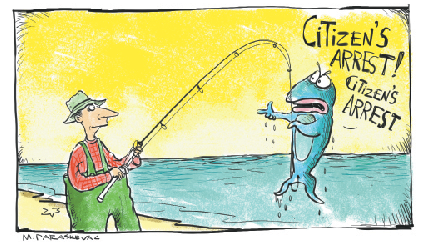East End Fishermen Enjoy Victories Over Regulators

In 2009 the State of New York passed a law requiring everybody who throws a line into the ocean to buy an annual $10 surfcasting license. It was supposed to raise millions of dollars a year. But the public would have none of it.
I recall the entire village of Montauk going into open rebellion when this was announced. The State printed up the licenses, gave them to the fishing tackle stores and gas stations that sold to fishermen, and many of these wonderful merchants simply gave them all away. “Get Your Free Fishing License” was the sign in one window. Similar behavior occurred in Hampton Bays and at other fishing ports around the Island.
The State noted other places have licenses you have to buy to go surfcasting. It will raise money.
“The hell with you,” said the fishermen.
In its first year, the State sold 142,085 licenses to the unsuspecting unwashed fishing public, bringing in $2.57 million. They did this not through marinas and gas stations and fishing stations but through motor vehicle bureaus and other state agencies where, online or by signs in windows, they could make veiled threats about what would happen if you didn’t buy one. Most were sold upstate, even though there is no saltwater.
Besides the boycott that first and second year, lawsuits were filed. Here on Long Island in 2010, seven Long Island towns claimed they had the right to surfcast and take fish from the Atlantic surf since colonial times for free. They went to court. And they won a lawsuit. In April 2011, Governor Andrew Cuomo announced the end to the saltwater fishing licenses. But they did not end everywhere in the state. The licenses would end all along the shoreline of Long Island and up the Hudson River as far as the Troy Dam near Albany. Beyond that you still had to get a $10 saltwater fishing license. For $10, what the hell. What if we take a trip to the ocean? At least you’d have the fishing license.
Another victory for the fishermen came last month, when a case in court resulted in the New York State Department of Environmental Conservation (DEC)—the government agency that regulates fishing—sending a check to an East End fisherman after a disgraceful affair where an agent went onto the private property of a fishing family, the Lesters, when nobody was around and, without a warrant or consent, removed more than $200 worth of fish (as “evidence” of wrongdoing). The agency then sold the fish to a retail fish store nearby, with the money going to the DEC’s Marine Resources Account of the State Conservation Fund. That happened in 2011. The fishing family was exonerated of any wrongdoing and still the agency kept the money from the fish that had been sold. Finally, under extreme government pressure, the agency coughed up the money from the sale by writing a check to the Lesters. A second case involving a Greenport fisherman also resulted in money being returned. Wow!
In any case, our Long Island fishermen, having caught the attention of those up in Albany, are now on the road to still another victory, we hope. Last week a bill passed through the Senate—and now rests with the Assembly—which would revise a way the State counts the fish caught by the fishermen.
Under the current law, commercial fishermen have a daily limit on the number of fish they can catch. Most fishermen, though they might object to the number of fish they are restricted to, do not object to this business in general. You have to limit the catch so as to not have the fishery depleted. But many believe the restrictions were not thought through. For instance, the limit on fluke is 1,000 pounds of fluke per day per fisherman. It has been interpreted to mean one fisherman, one boat, 1,000 pounds. And that’s how it’s been since 2011.
This makes sense on paper. But reality is a different matter. What if it’s a big boat and there are two captains, one of whom has his ship in for repairs? The two captains cannot take home 1,000 pounds each. They can only take home 500 pounds each. If they get to 1,000 pounds, no matter what the time and no matter how many fish are jumping, they have to turn around and come home. And if it’s the next day and the seas are high and they can’t go out, they lose that 1,000-pound quota for that day.
The bill that passed the Senate last week, at the urging of the fishermen, keeps the same number of fish caught per day, but allows you to keep score of your catch on a weekly basis. Now it would be flexible. You could catch a whole week’s worth of fish in just one day. The rest of the week, you can put your feet up and just smoke a pipe by the fire. And also, you don’t have to worry if the seas are too high.
In another part of the bill, it’s allowed that if you have a big enough boat to handle it, you can have two or even as many as four captains out in one boat and capture the weekly total, not only in one day but as if it were all four boats. This will indeed save a lot of gas and time. And it will also save a lot of wear and tear on the other fishing boats.
One fish, two fish, three fish, four. It’s all numbers and it just keeps going on and on.



